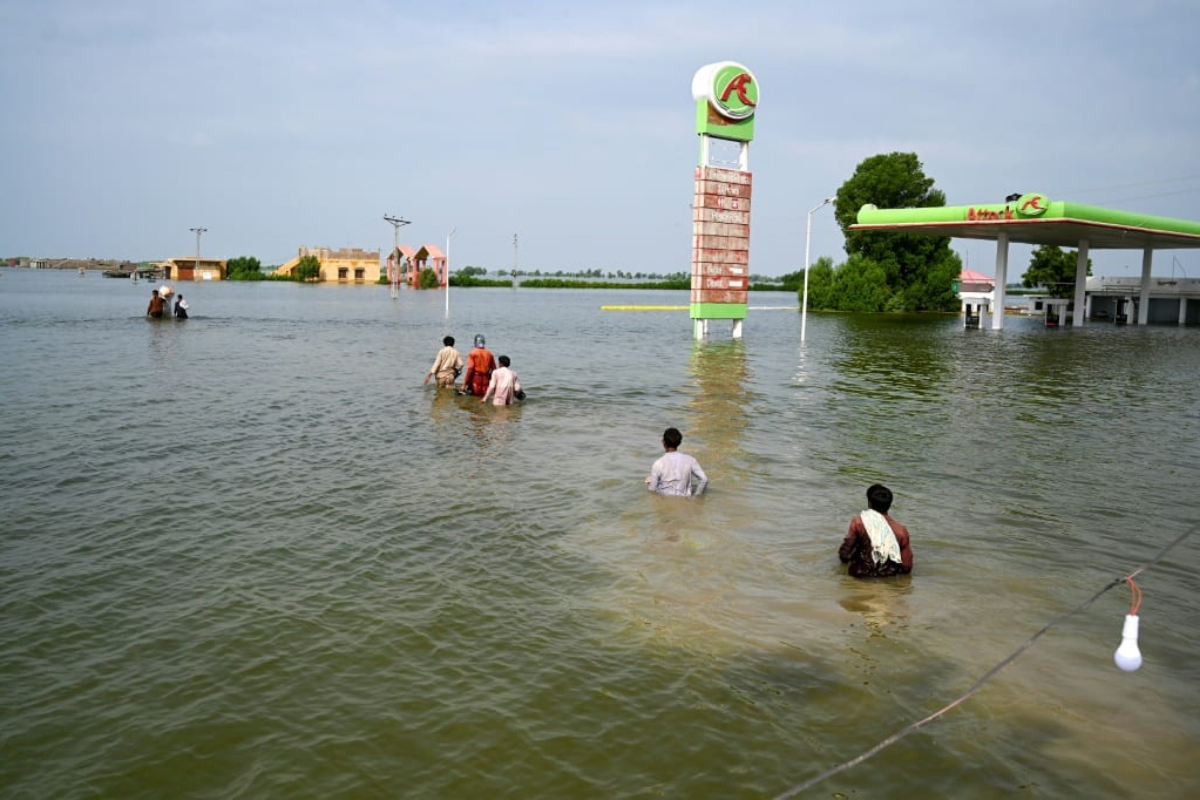- More than 100,000 people have been forced from their homes in Pakistan’s southern city of Mehar.
- The new body of water was caused by record rainfall and the Indus River spilling its banks.
- Nearly two million homes and businesses were destroyed, 7,000 kilometres of roads were washed away.
- The government’s top priority is to drain the flooded areas.
MEHAR, Pakistan: Minarets of mosques and a petrol station’s price board can be seen protruding above a large lake that has arisen and expanded to be tens of kilometres wide from a hurriedly constructed levee defending Mehar city.
Floods that have ravaged nearly a third of Pakistan have ruined hundreds of communities and vast tracts of agriculture beyond this beach in southern Sindh.
“Nobody knows where their village is anymore, the common man can no longer recognise his own home,” Ayaz Ali, whose village is submerged under nearly seven metres (23 feet) of water, told AFP.
According to the Sindh administration, this new body of water, which was caused by record rainfall and the Indus River spilling its banks, has forced more than 100,000 people from their homes.
Nearly two million homes and businesses were destroyed, 7,000 kilometres (1.3 miles) of roads were washed away, and 256 bridges were demolished nationwide, affecting around 33 million people.
Ali, a bus driver with an excellent recall, serves as the navy’s navigator, recognising each flooded settlement by its arrangement of power pylons and distinctive tree lines.
Two lifeboats operated by navy volunteers ply the waterways, distributing supplies donated by citizens and transporting those in need of medical attention back to the city.
With Ali’s assistance, they look for areas of high ground where families continue to take refuge, unwilling to leave despite the difficult circumstances made worse by the sweltering heat.
“Their homes and belongings are so precious to them,” said one serviceman, who asked not to be named, looking out at the expanse of water.
“When I joined the navy, I could never have imagined doing this,” he added.
With the engine turned off, the boat slowly makes its way through the treetops and ducks beneath power lines as it approaches a settlement of dilapidated homes surrounded by water.
[embedpost slug = “/pafs-rescue-and-relief-operations-continue-in-flood-affected-areas/”]
“How can we leave?”
This time, a lot of people have assembled.
Many people still hesitate to leave their houses out of fear that their cattle, which is all they have left, would be stolen or killed as well as out of dread that things will get worse at the impromptu relief camps that have cropped up across the nation.
“Our life and death is linked with our village, how can we leave?” Aseer Ali, who was knee-deep in water, declared that he would not let his wife, who was eight months pregnant, go.
Men with fever, children with diarrhoea, and an elderly woman who is mute in her suffering are among those brought into the boat, which is carrying twice as many people as it can hold as it makes its way back to the city.
One of them is a young woman who just last week lost her infant when the water level rose near her house.
A naval serviceman repeatedly drenches her in water as she sways unsteadily from the affects of heat stroke. Her two-year-old toddler is also distressed by the sweltering midday sun.
[embedpost slug = “/punjab-flood-update-rains-claimed-151-lives/”]
Immense need
A brand-new 10-kilometer mud embankment has so far prevented the river from reaching Mehar city, which has hundreds of thousands of residents.
But over the past three weeks, displaced victims have flooded the city, setting up impromptu camps in parking lots, schools, and on highways.
“More families keep arriving at the camp. They are in a terrible condition,” Muhammad Iqbal, from the Alkhidmat Foundation — a Pakistan-based humanitarian organisation that is the only welfare presence at the city’s largest camp, which hosts about 400 people.
He continued, “There is an immense need for drinking water and toilet facilities,” but they may have to wait longer because the government’s top priority is to drain the flooded areas.
Engineers have been forced to intentionally break overloaded dams and reservoirs to spare heavily populated regions at the expense of making the situation in the countryside worse.
Umaida Solangi, a 30-year-old mother seated on a wooden bed at a city camp with her children, stated, “They all have gone all out to protect the city but not the poor people of the rural areas.”
[embedpost slug = “/china-announces-emergency-humanitarian-aid-for-flood-victims/”]



















